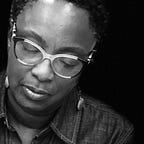What’s In A Name?
In the summer of 1980, I was a precocious 19-year-old, with an apartment, a job in the Pan Am building, and more than a year of college courses under my belt. I had emigrated from Barbados five years earlier and was still adjusting to being away from my beloved grandmother. Without familial support, I had no time to stand still as I navigated the foreignness, the swiftness of New York City. I was determined not to squander the precious opportunity I had been given to live in the United States of America and to return home to Barbados someday, a magnificent success!
From East Flatbush in Brooklyn, I trekked to Manhattan daily via the #4 Train. The subway was an altered universe with men pressing their tumescence on women’s legs, people scrambling for seats, and the usual lunatic who sent commuters scattering to other cars. My sing-song Bajan accent was still a dominant feature of my speech; along with the signature eye roll, sucking of teeth, and lightning-quick retorts evident in Rihanna.
My main goal was to make my grandmother proud. Being young and on my own, I had fun, but not too much fun. I would “go feting”, but not too often. I would scour the stores on Flatbush Avenue for sales but never bought too much. I would enjoy my freedom, but still not be too free. Everything I did would be tempered with caution. Although my grandmother was thousands of miles away, I would live as if I were being observed by my discerning guardian. Turning off extra lights, never leaving dirty dishes in the sink, and always being hygienic were my tenets.
Born prior to Barbados’s independence, my grandmother named me Margaret, presumably after the infamous rebel princess of the colonial empire. My mother had preferred the name Ingrid but had deferred to her mother. Although I’ve never liked my name or felt it suited me, I’ve taken comfort in Princess Margaret’s penchant for flouting conventions. I’ve always envied my contemporaries with names like Dawn, Joy, and June. Looking back, I don’t remember my grandmother ever calling me Margaret, unless she was angry. To her, I was “Gritty”. It would be years before I realized that she had converted the last syllable of my name into her pet name for me.
Sometimes she called me Mags, but mostly I was Gritty. I was incorrigible. I was a malcontent. I was a contrarian. And my grandmother did not attempt to change me, rather she seemed to encourage it. I would speak my mind to adults and accept the consequences. Once, I remember telling my mother I hated her and waiting for the obligatory physical assault. That day, she delighted in telling everyone what I had said; and holding on to that grudge for decades until dementia erased the memory.
I have always felt more like Gritty than Margaret. For a time, I was enamored with being called Maggie, by a man who got his creativity from Rod Stewart’s eponymous tune. Others have called me Ms. Thatcher. But during those summer weekends in New York, when I went to parties or the African Street Festival in Brooklyn or listened to drummers in Prospect Park, I was loathed to tell any of the dashing young revolutionaries who approached me in their dashikis that my name was Margaret. I always lied, naming myself Monique or Rashida or during my long-lasting African phase, Yashid.
Another memory that comes to mind, is me being about ten years old, and as I entered the village shop on an errand for my grandmother, the rheumy-eyed proprietor, Mr. Innis with his perennial cough, greeted me by name. Without missing a beat, a man in the shop asked “Are you a good one? I have never met a good Margaret in my life.” I stared in disbelief as the two men laughed. On my way home, I counted off the Margarets I knew; and they were indeed all fiery women.
Growing up, my siblings used my nickname mockingly, maybe because I was the only child in the family with a nickname. Occasionally, they text: “Have a nice day, gritty’ or “What’s up gritty?” And I am immediately taken back to that defiant little girl on that island, in search of an identity.
I’ve never forgotten when the image of ideal womanhood was cemented in my psyche. I could’ve been no more than seven years old, and on a shopping trip into the city with my mother, I saw a woman with a short afro, wearing sling-back shoes, and walking purposely, as if she owned the world. My eyes followed her as she slid into an MG convertible and drove away. She became my idol. I would later learn that she was a playwright, a journalist, and an actress. A woman with a hyphenated surname.
A few years ago, writers of curricula throughout the U.S., adopted and implemented their most current catchphrase “grit” into pedagogy. The “firmness of character and an indomitable spirit” that they wanted students to possess was, to me, part of my childhood name. Over the years, one or two brazen students have called me by my first name, and I was caught off-guard each time by the audacity of the act. And when my daughter calls me “Margaret” instead of “Ma” to remind me I’m being extra, it’s simultaneously amusing and foreign. Even when I am conducting business and my full name is announced, although I answer, the appellative doesn’t sit well with me. After more than 60 years of life, one would think I would have made peace with Margaret. I have not.
